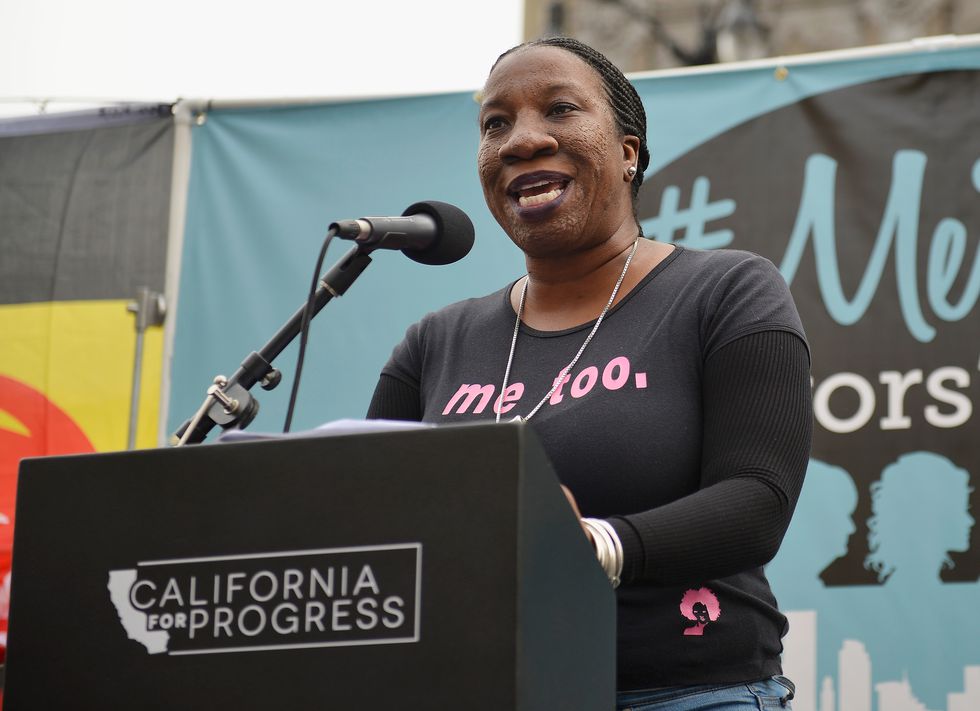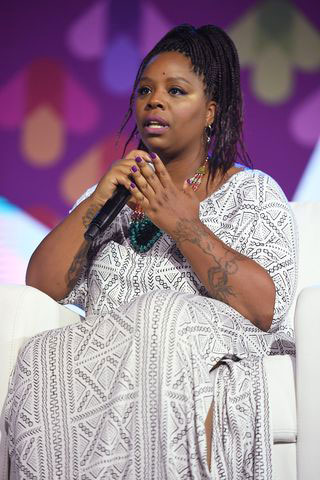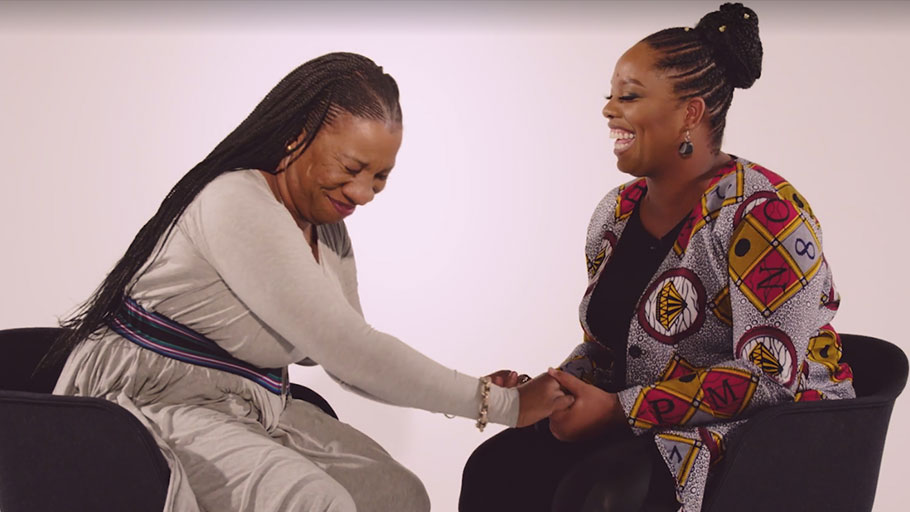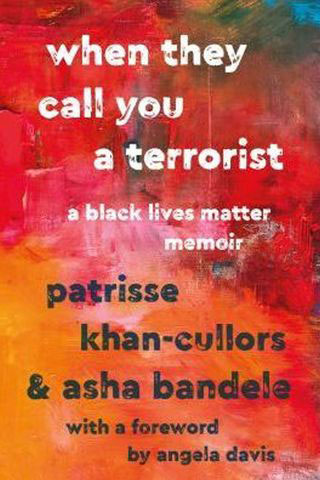The Founders of Black Lives Matter and the #MeToo Movement on Making Change.
Something’s snapped. After the 2016 presidential election, women nationwide wanted to make a scene. We flooded streets in protest. We filled out ballots. Whispers gave way to battle cries. We didn’t do it for “attention”; we did it for progress. In “Fired Up,” ELLE.com explores women’s rage—and what comes next.
Patrisse Cullors and Tarana Burke are recognizable, but their work is perhaps even more so. #BlackLivesMatter and #MeToo became the shorthand for the agitation and labor these activists lent to their causes, and the hashtags spread the word about police violence against black people and sexual harassment, respectively.
Here, two of the women behind the internet age’s most influential and far-reaching movements spoke to each other about turning a hashtag into a movement, the role of anger in activism, the power of making mistakes, and how to fight the status quo.
Video: How #BlackLivesMatter and #MeToo Went From Hashtags to Movements
Video Source — ELLE
How to Get Fired Up
“When there’s a deficit, when there’s a problem, we find a solution.”
Cullors: I’ll just keep it simple, which was the acquittal of George Zimmerman. Just clarity that I received in that moment, that folks did not care that that black boy died. And we’re not interested in holding George Zimmerman accountable, or the public, the white public that allowed for that to happen. I remember just feeling that that couldn’t be the period to the story. That George Zimmerman couldn’t just go home and that’s how history books were going to be written. And, that’s the birth of Black Lives Matter.
Burke: I was trying to think of something directly in relation to #MeToo, because there’s so many other things that have had me “fired up.” But definitely, living in a small city, living in Selma, which is where I was living when we gave birth to this. Living in a small city, looking every day in the faces of these black and brown girls that we were working with—seeing visibly the trauma that they were holding, and recognizing that trauma because of something that I had held, and feeling like I don’t have a way to help, I don’t have resources. What I know is that, in our communities and historically in the way that I’ve worked, when there’s a deficit, when there’s a problem, we find a solution.
For me, a turning point was going to the local rape-crisis center in Selma, and having this white woman come to the door, not let me in, and say, to me, “How can I help you?” And I said, “I just want to find out about what y’all do here.” She had her body physically in the door. And she said, “We don’t take walk-ins. If you have a situation, you have to go to the police station, fill out a report, and then somebody will meet you there.” I promise you, I left there, and I got in my car, and I sat in my car for a minute, and I, you know, had that conversation with God. You know that moment, when you’re just like, “I got a lot of work, I don’t wanna do this.” But I knew in that moment, I’m like, “These children need a thing, and nobody’s trying to provide it.” Not in our community or outside of our community, and so, that was a spark.
How to Turn a Hashtag Into a Movement
“If you are serious about making systemic change, it can’t just live online.”
Tarana Burke: I would imagine that once you have a hashtag that’s gone viral or it’s gotten a lot of attention or you create something that gets a lot of attention, that the next logical step for me would be to figure out how to take that off the internet and into the community or whatever the place is that you are in service of so that people can get a more robust understanding of what the work is, because it can’t live solely on the internet.
Patrisse Cullors: I think that’s absolutely right. With Black Lives Matter, we knew from the very beginning that it wasn’t just going to live online. We were like, We’re creating this thing and then it’s also going to live with black folks on the street and protests and organizations. It was very important for us to use the hashtag as a way to have a larger conversation and as an organizing tool.
Burke: I was just having this conversation, too, and I see the digital space as one tool in the larger arsenal that we use to do our organizing. It’s impossible, in this day and age, to not have a presence online, some sort of digital presence. But I think if you are serious about making systemic change, it can’t just live online.
Cullors: I think for Black Lives Matter, the first thing we did is we actually called our own folks, organizations, and community members and said, “What do you think about this? What do you think about using this? Should we be using it? Is it something interesting to have as a part of our larger conversation? Obviously a lot of black folks were like, “Finally.” Finally, we’re saying “black.”
Burke: Yes, explicitly.
Cullors: Exactly, and unapologetically. And not just saying “people of color.” And, especially because that was a moment when we were living in an era, where everywhere believed that we were at a “post-racial society.” Obama’s the president now, white folks thought that racism was over, and Black Lives Matter came in to have another conversation, and say: “Actually, racism is not at all over.” And we get to deal with it, we have to deal with it. And we have to take it to the streets.
“The work is to let people understand that it doesn’t live online, that this is something that has life outside of the internet”
Burke: I agree with that. With the #MeToo movement it’s opposite, because it started in the community, specifically under that name, and later on we had a small presence online, but very early on, on MySpace, and didn’t realize that that could be an organizing tool. It was actually a way for us to almost convene. We had conversations with people for the first time, interacted with people for the first time outside of our community. It made us realize that that the work was bigger than us and had to be spread wider. So now, I think, because it was popularized online in 2017, the work is to let people understand that it doesn’t live online, that this is something that has a life outside of the internet. And it’s more powerful, I think, when you have a combination of both on and offline.
How to Use Anger in Activism
“Most of us start this work because we’re angry.”
Cullors: I think, just to be honest with you, most of us start this work because we’re angry. We’re angry about what’s been done to us, we’re angry about what we witnessed, we’re angry about what we continue to witness, what hasn’t been intervened on. And that anger becomes part of the emotional toolbox that lifts the work and drives the work. But I would also argue that you can’t stay with just anger.
Burke: No. It’s not productive after a while. So we talk about righteous rage, or righteous anger. It can fuel you, but I think that people that just stay angry don’t ever produce anything. Right? At some point, you let the anger build you up, you find other people, and I think it’s also a way to connect with other people, because when you’re loud and you’re out-there and you’re talking about the things that make you angry, you find other people who are like-minded, and then once you find community, if the anger helps you find community, then you build from the community to do the work. But anger can’t drive you. Also, I think in both #MeToo and Black Lives Matter, people don’t understand that there’s also an undergirding of joy.

Burke speaking at the #MeToo Survivors March and Rally in November 2017, in Hollywood, California. Photo credit: Chelsea Guglielmino, Getty Images.
These movements aren’t about anger. We’re not angrily saying “Black Lives Matter.” We’re declaring it. It’s a declaration. We want to be seen as robust, full human beings that have anger and have joy. We want to be able to just freely have that joy. Like everybody else does. I think, also in #MeToo, it’s about learning how to cultivate joy so that you don’t live in the trauma. So, it’s…I forgot the question now. [Laughs].
Cullors: No, no, you in it, girl, you in it! I was just going to talk about joy, and that, oftentimes, as black people, as black women, we are literally seen as only angry. And people don’t actually see us as, maybe we might be grieving? Maybe we might be mourning?
“Oftentimes, as black people, as black women, we are literally seen as only angry.”
But they also can’t locate our joy. I think the other part for me is that I am committed to my child having a joyful life. I’m committed to that, and so this work is about that too. And that, I love us. I love us. And that is so deeply a part of the work.
Burke: That’s the weight and driving force of the work, right? More than anger, more than any emotion you can pull up is the love. You have to love us in order to commit your life in the ways in which we have and other people have committed our lives to this. Even when black folks make me angry, I know that the foundation is that I love us. I want us to win, and I want us to have all the things that we deserve in the world. And that’s driven by love. So I would submit that there are other tools in the arsenal besides anger. Anger’s probably a small part of the arsenal.
It’s sort of a jump-off or a place when you can get a spark, but the rest of it is driven by love and compassion and humanity and humility. There’s so many other emotions that we have to tap into in order to sustain ourselves and to sustain the work. Anger is almost the least of them.
How to Inspire Others to Act
“We have to be living examples.”
Cullors: I’ve been asked this question a few times, the “inspiring” question. I actually don’t really like to use that word because I don’t feel like I’m inspiring anybody to do anything. I feel like I’m trying to lead with example. I’m trying to be a model.
Burke: Oh my goodness. I totally agree with that.
Cullors: I guess what I’m trying to say is, I think the idea of someone coming in and inspiring people to do something is kind of like an old model. Someone comes in who “knows” better, and they share what they know. But I argue that we already know. Our communities know very well what we need. So really I’m just trying to be a model for what’s possible.

Cullors speaking onstage during the the 2017 ESSENCE Festival in July of 2017, in New Orleans, Louisiana. Photo credit: Paras Griffin.
Burke: Literally, those words, I agree with 100 percent. I think we can’t be the ones to declare that we’re inspiring somebody. If somebody happens to be inspired by what they see, then that’s for them to decide and to declare on their own. But yeah, we have to be living examples. It makes me think of when I was pregnant with my daughter, who’s now almost 21 years old, and it was the ’90s and people forget about all the organizing that happened in the ’90s, where we were in the thick of organizing, and people were saying to me, in the community: “This is counter-revolutionary.” And, “How are you going to have this baby? You’ve got work to do.”
And I remember thinking, and I had an elder say this to me, too, “If I have this child, and I’ve raised this child to be the kind of human being that I want to live with in the world, to shape her to be the kind of person that we’re trying to organize to have a community that looks like, then I’ve done a thing. I can create a model for what it is to be…” We talk about black excellence and black love? Then I can create a model for that. That’s “work” to me.
We’re not perfect—that’s the other part of that, too. When you start asking about how we inspire people, it gets into this area of, again, the “charismatic leader” kind of thing, and it makes you almost above reproach. I just don’t want to be in that category.
How to Learn From Our Mistakes
“I would really want to challenge our movements to honor mistakes more.”
Cullors: I think some people think, especially when you get to a level of visibility, that this is the easy work.
Burke: Oh yeah, God. [Laughs].
Cullors: This is exhausting. It’s time away from our families, time away from ourselves. We are, in a lot of ways, being seen as sort of almost elected officials sometimes…Where we’re being asked to do things for people. And then, as black women, we’re asked to give and give and give, so I think the “mistakes” part reminds people that we’re human beings and that, even with a public profile, that we are going to make mistakes because that’s what human beings do, and that actually mistakes are not bad necessarily.
Burke: It’s how you deal with them, right? It’s about resilience to me. And so, I’m not a public figure. I guess I am now, but I’ve not, historically, been a public figure, and so I always worry about not being polished enough, or not saying the right thing, or just reverting back to my Bronx-ness…In ways that might offend folks. Or not being able, you know, because I represent a movement that’s about sexual violence or whatever, people are like, “Well, you can’t say this, and you can’t do that, and you can’t wear that.” There’s all of these rules now, and I’m just like, “I can’t live like that.” In some ways, I feel like I’m almost a walking mistake, because I either have to be me or I have to be what others dictate me to be, and we can’t live like that.
Cullors: Nope. So we shouldn’t, because that goes back to the piece about “inspiring.” That’s not “modeling,” I don’t want to model that. I don’t want to live double lives. I would really want to challenge our movements to honor mistakes more, because we live in a really “call out” moment. And then people will make mistakes but hide them, and make them private and secret…
Burke: Or make it worse.
Cullors: I think publicly declaring that mistakes are a part of how we grow and how we heal is absolutely necessary.
Burke: Our organization, Just Be, we had an “ism” that the girls had, and it was like, “Don’t be afraid of how you fall, just focus on how you bounce back.”
How to Fight the Status Quo
“Read Books. Talk to People That Are Older Than You. Talk to People Who Are Younger Than You.”
Cullors: Whenever I talk to, especially young people, because often young people ask me, “How do I do what you did?” And I always say, “Pick your issue.” What are you feeling most passionate about? What do you feel is something that you actually want to deal with? I know where I live in L.A., students are dealing with being randomly searched inside their schools, and so there’s a huge campaign around ending random searches. So I’m working with the young people. I’m just doing basic political education. Like, this is a system. This is a set-up. And giving them the tools so they can figure out, “Okay, this is what we want to focus on.” Their first focus is ending random searches, but ultimately, they want to get cops out of schools.
Burke: Exactly. I think what you said is really important too, about the tools, though. I think the first step for people who want to do this work in any long-term capacity is to get some tools. Get some education. I think people think that we just woke up one day, and turned into superheroes, and just went out into the world…All of the work that we’ve done up to now, has informed where we are.
And we have an extensive political education, an extensive on-the-ground, hands-on education. I think it’s really important for people to seek that out. Read books. Talk to people that are older than you. Talk to people who are younger than you. Just talk to people who are steeped in the issue in different ways than you. Have a really extensive interest in what the issue is. I would agree with that. Find what your issue is, and then immerse yourself, beyond your own experience.
















